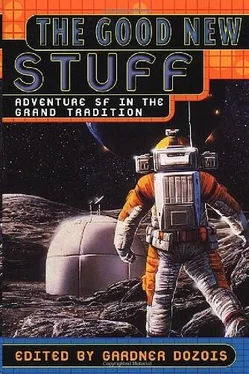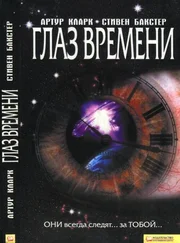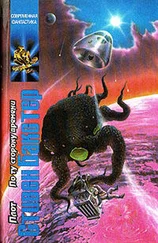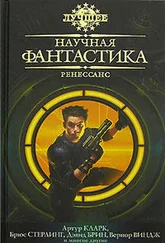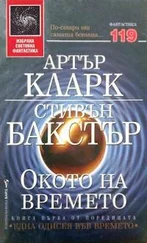Стивен Бакстер - The Good New Stuff
Здесь есть возможность читать онлайн «Стивен Бакстер - The Good New Stuff» весь текст электронной книги совершенно бесплатно (целиком полную версию без сокращений). В некоторых случаях можно слушать аудио, скачать через торрент в формате fb2 и присутствует краткое содержание. Год выпуска: 2002, ISBN: 2002, Издательство: St. Martin's Griffin, Жанр: Фантастика и фэнтези, на английском языке. Описание произведения, (предисловие) а так же отзывы посетителей доступны на портале библиотеки ЛибКат.
- Название:The Good New Stuff
- Автор:
- Издательство:St. Martin's Griffin
- Жанр:
- Год:2002
- ISBN:0-312-26456-9
- Рейтинг книги:3 / 5. Голосов: 1
-
Избранное:Добавить в избранное
- Отзывы:
-
Ваша оценка:
- 60
- 1
- 2
- 3
- 4
- 5
The Good New Stuff: краткое содержание, описание и аннотация
Предлагаем к чтению аннотацию, описание, краткое содержание или предисловие (зависит от того, что написал сам автор книги «The Good New Stuff»). Если вы не нашли необходимую информацию о книге — напишите в комментариях, мы постараемся отыскать её.
The Good New Stuff — читать онлайн бесплатно полную книгу (весь текст) целиком
Ниже представлен текст книги, разбитый по страницам. Система сохранения места последней прочитанной страницы, позволяет с удобством читать онлайн бесплатно книгу «The Good New Stuff», без необходимости каждый раз заново искать на чём Вы остановились. Поставьте закладку, и сможете в любой момент перейти на страницу, на которой закончили чтение.
Интервал:
Закладка:
"We've got all of a third of a gee down here, you know. You'll get used to it. Let your eyes dark-adapt. We don't have to hurry this."
She looked up.
In her peripheral vision, the stars were already coming out. She looked for a bright double star, blue and white. There it was: Earth, with Luna.
And now, with a slow grandeur, the landscape revealed itself to her adjusting eyes. The plain from which the rover had climbed spread out from the foot of the crater wall-mountain. It was a complex patchwork of crowding craters, ridges and scarps— some of which must have been miles high— all revealed as a glimmering tracery in the starlight. The face of the planet seemed wrinkled, she thought, as if shrunk with age.
"These wall-mountains are over a mile high," Scholes said. "Up here, the surface is firm enough to walk on; the regolith dust layer is only a couple of inches thick. But down on the plain the dust can be ten or fifteen yards deep. Hence the big wheels on the rover. I guess that's what five billion years of a thousand-degree temperature range does for a landscape…."
Just twenty-four hours ago, she reflected, Larionova had been stuck in a boardroom in New York, buried in one of Superet's endless funding battles. And now this… wormhole travel was bewildering. "Lethe's waters," she said. "It's so— desolate."
Scholes gave an ironic bow. "Welcome to Mercury," he said.
Cilia-of-Gold and Strong-Flukes peered down into the Chimney cavern.
Cilia-of-Gold had chosen the cavern well. The Chimney here was a fine young vent, a glowing crater much wider than their old, dying home. The water above the Chimney was turbulent, and richly cloudy; the cavern itself was wide and smooth-walled. Cilia-plants grew in mats around the Chimney's base. Cutters browsed in turn on the cilia-plants, great chains of them, their tough little arms slicing steadily through the plants. Sliding through the plant mats Cilia-of-Gold could make out the supple form of a Crawler, its mindless, tube-like body wider than Cilia-of-Gold's and more than three times as long….
And, stalking around their little forest, here came the Heads themselves, the rulers of the cavern. Cilia-of-Gold counted four, five, six of the Heads, and no doubt there were many more in the dark recesses of the cavern.
One Head— close to the tunnel mouth— swiveled its huge, swollen helmet-skull toward her.
She ducked back into the tunnel, aware that all her cilia were quivering.
Strong-Flukes drifted to the tunnel floor, landing in a little cloud of food particles.
"Heads," she said, her voice soft with despair. "We can't fight Heads."
The Heads' huge helmet-skulls were sensitive to heat— fantastically so, enabling the Heads to track and kill with almost perfect accuracy. Heads were deadly opponents, Cilia-of-Gold reflected. But the people had nowhere else to go.
"We've come a long way to reach this place, Strong-Flukes. If we had to undergo another journey" — through more cold, stagnant tunnels— "many of us couldn't survive. And those who did would be too weakened to fight."
"No. We have to stay here— to fight here."
Strong-Flukes groaned, wrapping her carapace close around her. "Then we'll all be killed."
Cilia-of-Gold tried to ignore the heavy presence of the Seeker within her— and its prompting, growing more insistent now, that she get away from all this, from the crowding presence of people— and she forced herself to think.
Larionova followed Kevan Scholes up the slope of the wall-mountain. Silicate surface dust compressed under her boots, like fine sand. The climbing was easy— it was no more than a steep walk, really— but she stumbled frequently, clumsy in this reduced gee.
They reached the crest of the mountain. It wasn't a sharp summit: more a wide, smooth platform, fractured to dust by Mercury's wild temperature range.
"Chao Meng-Fu Crater," Scholes said. "A hundred miles wide, stretching right across Mercury's South Pole."
The crater was so large that even from this height its full breadth was hidden by the tight curve of the planet. The wall-mountain was one of a series that swept across the landscape from left to right, like a row of eroded teeth, separated by broad, rubble-strewn valleys. On the far side of the summit, the flanks of the wall-mountain swept down to the plain of the crater, a full mile below.
Mercury's angry sun was hidden beyond the curve of the world, but its corona extended delicate, structured tendrils above the far horizon.
The plain itself was immersed in darkness. But by the milky, diffuse light of the corona, Larionova could see a peak at the center of the plain, shouldering its way above the horizon. There was a spark of light at the base of the central peak, incongruously bright in the crater's shadows: that must be the Thoth team's camp.
"This reminds me of the Moon," she said.
Scholes considered this. "Forgive me, Dr. Larionova. Have you been down to Mercury before?"
"No," she said, his easy, informed arrogance grating on her. "I'm here to oversee the construction of Thoth, not to sightsee."
"Well, there's obviously a superficial similarity. After the formation of the main System objects five billion years ago, all the inner planets suffered bombardment by residual planetesimals. That's when Mercury took its biggest strike: the one which created the Caloris feature. But after that, Mercury was massive enough to retain a molten core— unlike the Moon. Later planetesimal strikes punched holes in the crust, so there were lava outflows that drowned some of the older cratering."
"Thus, on Mercury, you have a mixture of terrains. There's the most ancient landscape, heavily cratered, and the planitia: smooth lava plains, punctured by small, young craters."
"Later, as the core cooled, the surface actually shrank inward. The planet lost a mile or so of radius."
Like a dried-out tomato.
"So the surface is wrinkled."
"Yes. There are rupes and dorsa: ridges and lobate scarps, cliffs a couple of miles tall and extending for hundreds of miles. Great climbing country. And in some places there are gas vents, chimneys of residual thermal activity." He turned to her, corona light misty in his faceplate. "So Mercury isn't really so much like the Moon at all…. Look. You can see Thoth."
She looked up, following his pointing arm. There, just above the far horizon, was a small blue star.
She had her faceplate magnify the image. The star exploded into a compact sculpture of electric blue threads, surrounded by firefly lights: the Thoth construction site.
Thoth was a habitat to be placed in orbit close to Sol. Irina Larionova was the consulting engineer contracted by Superet to oversee the construction of the habitat.
Thoth's purpose was to find out what was wrong with the Sun.
Recently, anomalies had been recorded in the Sun's behavior; aspects of its interior seemed to be diverging, and widely, from the standard theoretical models. Superet was a loose coalition of interest groups on Earth and Mars, intent on studying problems likely to impact the longterm survival of the human species.
Problems in the interior of mankind's only star clearly came into the category of things of interest to Superet.
Irina Larionova wasn't much interested in any of Superet's semi-mystical philosophizing. It was the work that was important, for her: and the engineering problems posed by Thoth were fascinating.
At Thoth, a Solar-interior probe would be constructed. The probe would be one Interface of a wormhole terminal, loaded with sensors. The Interface would be dropped into the Sun. The other Interface would remain in orbit, at the center of the habitat.
Читать дальшеИнтервал:
Закладка:
Похожие книги на «The Good New Stuff»
Представляем Вашему вниманию похожие книги на «The Good New Stuff» списком для выбора. Мы отобрали схожую по названию и смыслу литературу в надежде предоставить читателям больше вариантов отыскать новые, интересные, ещё непрочитанные произведения.
Обсуждение, отзывы о книге «The Good New Stuff» и просто собственные мнения читателей. Оставьте ваши комментарии, напишите, что Вы думаете о произведении, его смысле или главных героях. Укажите что конкретно понравилось, а что нет, и почему Вы так считаете.
